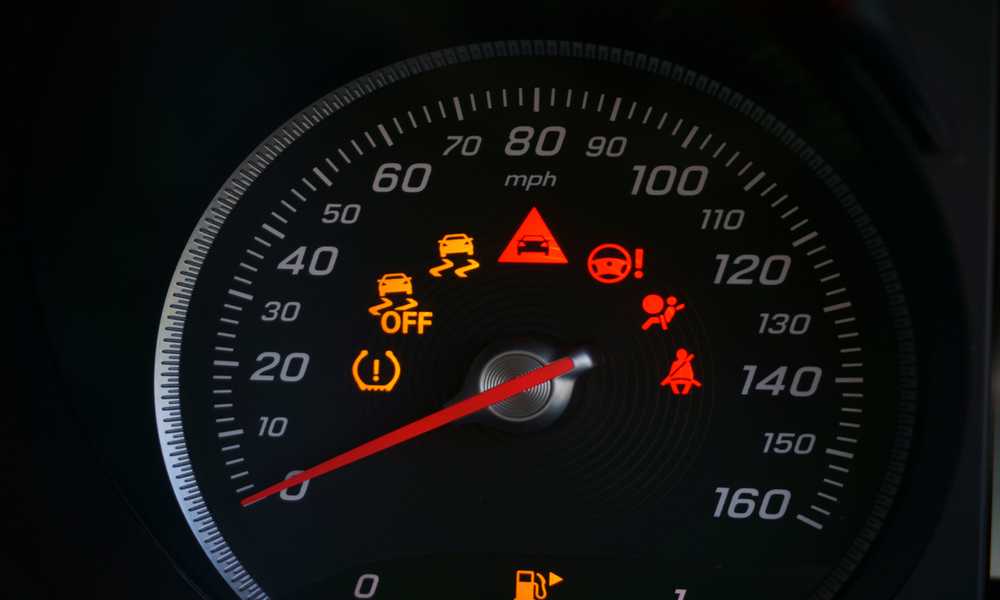Is the sight of your Toyota’s dreaded trac off and check engine lights enough to send you into a state of panic? You are, of course, not alone in this. It’s a typical occurrence that may make any automobile owner feel sick to their stomach. Now is not the time to start panicking and calculating how much it would cost to fix everything. This post will investigate the reasons behind these alerts and offer helpful advice for resolving them. Get comfortable, because we’re about to venture into the unknown territory of trac off and check engine lights Toyota!
Causes of trac off and check engine light toyota
1. Problems with the car brakes

The brake system is essential to your safety on the road, thus any problems should be addressed immediately.
Worn brake pads or rotors could be the blame. Worn out or deteriorated components have a diminished ability to stop the vehicle. The trac off and check engine lights may come on to alert the driver.
A faulty brake fluid level sensor is another possible source of trouble. This sensor checks the brake fluid level periodically. When it senses low levels or a leak, it will send a signal to the user via the indicator lights.
The Anti-lock Braking System (ABS) module can potentially be at fault for the dashboard warning lights to illuminate. Any malfunction of the module’s sensors or solenoids will result in the generation of an error code.
If your brakes are giving you trouble, get them fixed as soon as possible for your own safety on the road. TRAC OFF and check engine light alerts can be caused by issues with your car’s brakes, so it’s best to have a professional diagnose and remedy the problem.
2. Turning off the traction control system
The purpose of the traction control system is to keep the vehicle from skidding when accelerating. However, there are times when turning it off is necessary.
Turning off traction control could be a good idea if you get trapped in a lot of slush or mud. The wheels will have more room to move and you’ll have a better chance of getting unstuck if you disable the system.
Turning off the traction control system may also be necessary when driving on gravel roads or other rough or uneven surfaces. Because typical wheel slide can be misread by the system as a lack of traction, activating the system could reduce your vehicle’s performance.
Most Toyota vehicles have a TRAC OFF button on the dashboard or central console that disables the traction control system. When this button is pressed, the anti-lock braking system and the traction control system are turned off. Inactivating these safeguards means they will no longer provide any help when driving.
It’s worth noting that disabling the traction control system may temporarily improve handling in some situations, but doing so should be done with care. If you need to disable your car’s safety features, do so only when it’s completely risk-free to do so.
Deactivating the Toyota’s traction control system can cause the TRAC OFF and check engine lights to illuminate. While there may be times, such when you’re stuck or traveling over difficult terrain, when you need to do this, keep in mind that doing so regularly undermines the overall safety measures given by these systems.
3. Problematic wheel speed sensors

If your Toyota’s trac off and check engine light have come on, faulty wheel speed sensors could be to blame. These sensors are in charge of keeping tabs on how fast each wheel is spinning. They give the traction control system essential data for making power adjustments and braking decisions.
Both lights will come on if any of the sensors are malfunctioning or have failed entirely. A faulty sensor could trigger the traction control system when it isn’t necessary or prevent it from kicking in at all. This can reduce the vehicle’s stability and possibly affect how well it brakes.
There are a few potential sources of failure in wheel speed sensors. A common issue is dirt buildup around the sensor’s surface, which prevents it from accurately detecting the wheel’s rotation. Road debris and extreme vibration are two more potential causes of damage.
This problem can only be fixed by having a trained technician inspect the vehicle and then replace the defective wheel speed sensor. Any malfunctioning sensors can be easily replaced by a trained professional.
Driving with a broken wheel speed sensor can disable your vehicle’s safety features, so don’t put your safety at risk.
4. Issues with the Wires
Possible causes of your Toyota’s “trac off” and “check engine” lights include frayed or damaged cables. The wiring system in your car is what carries electrical impulses to the various parts of the car.
Wires can deteriorate and fray over time owing to normal use, exposure to the elements, and rodents. A issue with the traction control system or the engine sensors’ wiring can cause both lights to come on in the instrument cluster.
A breakdown in a transmission of electrical signals can occur in critical systems like traction control and engine performance monitoring if wires are faulty or broken. Because of this, road stability and safety may be jeopardized.
All wiring connections for these systems should be inspected to find and remedy the problem. In the event of any wire damage or wear and tear, have it checked thoroughly by a professional mechanic who has knowledge with automobile electrical systems.
Putting off addressing a problem with your wiring may cause it to worsen in the long run. If you have a problem with your Toyota’s wires and the trac off and check engine lights come on, you should have it looked out as soon as possible.
5. Bad road conditions

The traction control system is susceptible to disruption when driving on rough, uneven, or pothole-filled roads. Constant jolting and vibrations from driving on terrible roads might cause numerous sensors to give inaccurate data.
One such problem that poor road conditions can create is ruined wheel speed sensors. These sensors are vital since they report the speeds of all four wheels to the car’s central processing unit. Damage or misalignment from bumpy roads could compromise their ability to collect reliable data.
Even the wiring that connect your car’s various parts can break if the road isn’t good enough. Constant jolting and bouncing on rough surfaces can loosen or shred these wires, resulting in electrical faults that set off alarms.
Note that while poor road conditions may initially cause your Toyota’s trac off and check engine lights to illuminate, this is not always an indication of a significant mechanical problem. If these lights don’t go away after a while of driving on calm roads, however, you should have your car checked by a specialist.
Drivers need to take extra precautions on bumpy or uneven roads to avoid causing accidents and reducing the likelihood of erroneous sensor readings. Reduce the strain on your car by taking it easy on the gas and the brakes when you need to.
Keep in mind that keeping your suspension in good shape and your tires properly inflated also assist greatly to reducing the impact of poor road conditions. Safe driving practices and anticipating potential road hazards will help you and your Toyota continue to function normally no matter what lies ahead.
6. Steering rack system problems
The steering rack facilitates easy and precise wheel rotation, however when it’s malfunctioning, an indicator light will illuminate.
A power steering fluid leak is a common issue with the steering rack. If the power steering fails, you may have trouble controlling your vehicle. Damaged or worn inner tie rods can likewise wreak havoc on the steering rack.
A faulty electronic control unit (ECU) that regulates your Toyota’s numerous systems, such as the traction control and engine management, is another possible issue. If there is a problem with this part, it could send faulty signals to these other systems, setting off alarms.
Take your Toyota to a trained mechanic who has experience fixing steering rack systems for a proper diagnosis and repair. If there are any leaks or damage in the system, these can be found and fixed or replaced.
Maintaining your vehicle’s peak performance and maintaining your safety depend on swiftly fixing any issues with the steering rack.
7. Broken ECU

The Engine Control Unit (ECU) of your Toyota is an integral part of the vehicle’s engine management system. Among the many things it regulates are the engine’s fuel injection, ignition timing, and emissions. But if the ECU fails or shows signs of malfunction, it may cause the Trac Off and Check Engine lights to turn on.
A malfunctioning ECU may have occurred for a number of reasons. Electrical problems, like short circuits or corrosion, can corrode interior components and cause failure. The ECU may fail for other reasons as well, such as due to faulty software or poor programming.
If the ECU fails, it may not be able to exchange data with the rest of the car’s components. Due to a lack of connection, sensors may report inaccurate data, triggering misleading error codes.
In most cases, repairing an ECU requires the expertise of a specialist with a background in troubleshooting and repairing electronic devices. In order to determine whether your ECU has to be repaired or replaced, they will likely employ sophisticated diagnostic equipment.
Keep in mind that operating the car with a faulty ECU could cause additional wear and tear on the engine and other parts. It is advisable to get treatment from a specialist right away with any problem like this.
The Trac Off and Check Engine lights on your Toyota’s dashboard can be caused by a faulty ECU. If you want to avoid more damage and guarantee peak performance from your car, you should have a professional inspect, diagnose, and repair this vital part.
8. ABS malfunction
The Anti-lock Braking System (ABS) works to keep the wheels from locking up under pressure. Both indicators may light up if something goes wrong.
A malfunctioning ABS system may be the result of a faulty ABS sensor or a broken ABS module. This may be the result of everyday use, electrical problems, or collisions with road debris.
In the event of an ABS system failure, braking performance may be compromised. It could make it harder to stop or perhaps cause you to lose control if you brake too hard.
If you see the “Trac Off” and “Check Engine” lights on your dashboard and assume an ABS problem is to blame, have your car checked out as soon as possible. Using high-tech diagnostic tools, they’ll figure out what’s wrong and fix it, if possible.
Keep in mind that if your ABS is not working properly, your safety on the road may be jeopardized. If you want your car’s braking system to function properly, you should take care of these problems as soon as possible.
9. Computer problems
Computer issues may be to blame for your Toyota’s trac off and check engine light. The car’s computer, also called the Engine regulate Unit (ECU), is an integral part of the vehicle’s ability to monitor and regulate its many subsystems.
Both the trac off and check engine lights may come on if the ECU is malfunctioning. It’s possible that this is a sign of trouble with the ECU or one of the sensors or components it’s linked to.
Wiring difficulties, poor connections, and even water damage can cause computer troubles. Unexpected illumination might also be the result of software flaws or faults.
When your Toyota’s trac off and check engine lights start flashing, it’s best to get it looked at by a qualified repair who has familiarity with automotive computers. They will have access to diagnostic equipment that can retrieve error codes from the ECU’s memory and reveal the source of the problem.
Keep in mind that if you ignore computer difficulties, it could cause more damage or decrease in performance to your car. Therefore, it is usually preferable to deal with them as soon as possible for maximum security and functionality.
10. Broken brake light switch

Your Toyota’s “TRAC OFF” and “Check Engine” lights may be on because of a faulty brake light switch. This seemingly insignificant part is essential to the safe operation of your car’s braking mechanism.
When you apply pressure to the brakes, the switch in charge of turning on the brake lights will be triggered. It also notifies other devices, such the traction control and engine management systems, of your braking activity.
When this switch malfunctions or breaks, it might cause a number of problems. Because of this, other motorists may not be able to notice that you are slowing down or stopping, which is extremely dangerous.
A faulty brake light switch can give erroneous information to your car’s sensors. As a result, you may see the “TRAC OFF” and “Check Engine” warning lights illuminate at the same time.
Warning lights on the dashboard could indicate a malfunctioning brake light switch; have it checked out as soon as possible by a professional mechanic if you feel this is the case. If you choose to ignore this problem, it may affect your driving ability.
How to fix Trac Off and check engine light Toyota?
If any of these indicators flash up on your dashboard, don’t dismiss them. They let you know that your car has a problem that needs fixing. Listed below are some suggestions for fixing the issue.
You might want to double-check the fundamentals. If your gas cap is loose, it could cause your check engine light to come on, so be sure to secure it. To clear any recorded error codes, you should then attempt removing and reinstalling the car’s battery.
If these quick repairs don’t do the trick, it may be time to call in a pro with knowledge of Toyota vehicles. Their advanced diagnostic equipment will allow them to zero down on the root of the problem when warning lights like the “trac off” and “check engine” come up.
Once the root of the problem has been isolated, appropriate fixes can be implemented. Fixing the traction control system could entail replacing broken sensors or parts, mending frayed wires, or resetting the system.
It’s important to keep in mind that repairing these lights calls for technical competence and familiarity with your specific vehicle model. If you want something diagnosed and fixed properly, you need use experts.
By acting quickly when these lights come on, you can keep your Toyota running smoothly and safely for years to come.
Why my Trac Off and check engine light Toyota?
This is a question that many Toyota drivers have asked themselves at some point. The truth is, there could be a number of causes for these lights to be on your dashboard.
Problems with the vehicle’s braking system could be a contributing factor. Brake issues, such as low fluid or worn pads, might cause the trac off and check engine lights to illuminate.
Inadvertently disabling the vehicle’s traction control system is another possibility. Turning off this feature can trigger the warning indicators since it helps maintain vehicle stability and prevents wheel slippage.
Wheel speed sensors that are malfunctioning are another possible cause. These sensors are mounted on each wheel and communicate with the ABS system to track its speed. The warning devices can go off if any of them develops a fault or sustains damage.
It’s also possible that problems with the wiring in your car are to blame for the symptom you’re experiencing. These lights will come on if the car’s systems are unable to communicate with one another, which can happen if a wire is damaged or comes loose.
Sometimes, poor road conditions might trick your car’s sensors into believing there’s an issue when there really isn’t. For instance, if you’re driving on ice or gravel, you might see a traction control warning pop up.
It’s also possible for issues with the steering rack system to trigger these indicators. Your vehicle’s handling may suffer if there are problems with the steering rack or the parts that make it work.
Both lights may illuminate if the Engine Control Unit (ECU) fails. The ECU regulates a number of critical engine processes, including the timing of fuel injection and ignition.
As both systems are integrated in most vehicles, a failure in either could cause issues with the other. For example, if a sensor fails, it could cause problems with the ABS as well.
Your car’s onboard computer having issues could also cause these lights to come on. Those warnings may have been activated because your car’s computer is sending out faulty signals.
Tell me the meaning of the TRAC OFF light?
Once the TRAC OFF light comes on in your Toyota’s instrument cluster, you know the traction control system has been disabled. The purpose of the traction control system is to keep the vehicle from skidding out during acceleration or when traveling on slick roads.
To disable this system is to effectively disable a safety function that aids in maintaining vehicle control. If you want more control over your vehicle’s performance or you’re in a circumstance where wheel spin is beneficial, such off-roading, this could be on purpose.
Driving with the TRAC OFF light on, however, may compromise your vehicle’s traction and stability controls. There may be a problem with the traction control system that is causing this.
If the TRAC OFF warning light turns on regularly or suddenly, it may be time to take the car in for service. As such, they are able to identify problems and guarantee safe and dependable operation of all systems.
Always put your safety in front of the allure of having complete command of your vehicle’s performance.
Is it safe to drive with Trac off light on?

When they see the warning light come on in their Toyota, many drivers immediately wonder what it means. That question can only be answered by investigating the circumstances surrounding the switch’s activation.
When the Trac off indicator illuminates, the traction control system has been turned off. Wheel slippage and subsequent loss of control can be avoided with the use of traction control in slick weather. Driving without traction control, then, raises the risk of skidding out, especially in slick circumstances.
If you’re driving in typical conditions and nothing seems wrong with your brakes or other safety features, you might be able to make it to a mechanic without stopping. Having the Trac off light illuminated isn’t necessary a cause for urgent alarm, but it does suggest there may be a problem that requires fixing.
If you see the Trac off light continuing to blink, you should get your car checked as quickly as possible to make sure you and your passengers are safe and to prevent any more damage to your vehicle. A professional mechanic will be able to identify and fix any problems before they become catastrophic.
Always put safety first when behind the wheel. If you’re not sure if it’s safe to drive with the Trac off light illuminated, it’s better to stay on the safe side and not risk anything.
Final thoughts
Dealing with the trac off and check engine light in your Toyota can be frustrating, but it’s important not to panic. These lights are indicators that something is amiss within your vehicle’s systems, specifically related to the traction control and engine performance.
When these lights appear, it’s crucial to address the underlying issues promptly. Ignoring them or continuing to drive without addressing the problem can lead to further damage and potentially compromise your safety on the road.
To fix these warning lights, start by identifying the cause of their activation. It could be anything from problems with your car brakes or wheel speed sensors to issues with wires or a broken ECU. Once you determine what is causing the trac off and check engine light in your Toyota, you can either attempt a DIY solution if you have knowledge about car repairs or take it to a trusted mechanic for professional assistance.
Remember that driving with these warning lights illuminated may affect certain aspects of your vehicle’s performance such as stability control and traction control systems. While it may still be safe to drive short distances under normal conditions, it is recommended not to push your luck and get any potential issues fixed as soon as possible.
In conclusion (avoided), understanding why trac off and check engine light illuminate in your Toyota is essential for maintaining its overall health and ensuring optimal performance on the road. By staying proactive when facing these warning signs, addressing any underlying problems promptly, and seeking professional help when needed; you can keep yourself safe while enjoying all that your Toyota has to offer.
Remember: Awareness leads to action! So don’t ignore those warning lights – take charge today!



